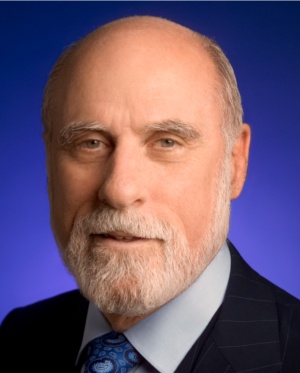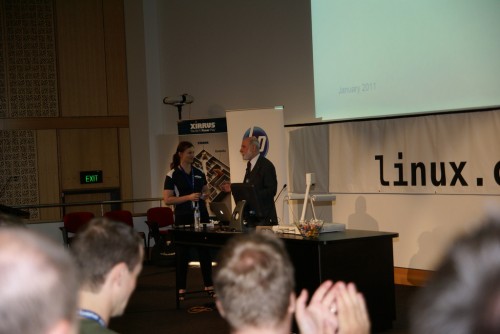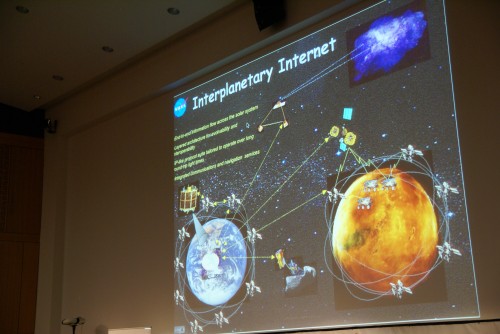Update: LCA2011 videos are now turning up over @ linuxconfau.blip.tv, including Vint Cerf’s keynote video, which this article was written for.
Google’s Vice President and Chief Internet Evangelist Vinton Cerf is about to take the stage at Linux.conf.au to deliver the conference’s primary keynote.
Cerf, with over 15 honorary degrees, is considered one of the ‘fathers of the Internet,’ given much credit for developing many of the protocols that makes the Internet what it is today.
Presently he is the Vice President of Google and their Chief Internet Evangelist. Cerf is a strong advocate of IPv6, and has a proven track record of being able to predict trends in computing over the last 3 decades.
Stay tuned as I update this article live during the keynote speech.
9:00am – The lights have dimmed and LCA2011 director Dr Shaun Nykvist is making a few announcements before Cerf speaks.
9:05am – A man dressed in a penguin suit just handed out a free Palm Pre to a member of the audience.
9:10am – Vinton Cerf takes the stage.
Cerf is talking about IPv6, and how the Internet deserves some more evolution. It’s stayed the way it has for the past decade or two.
Cerf is giving some statistics about Internet usage, many Internet users in Asia (over 800 million) compared to the USA (just over 200 million).
Cerf is talking about the beginnings of the Internet when he was working at DARPA in the 70s. Importantly, he is emphasizing that the Internet “has no global control” – it was never designed to be that way.
We didn’t have a particular application in mind when building the Internet.
Cerf says he is very proud of the fact that when they designed the Internet, the IP address structure was non-national.
9:15am – Cerf begins talking about the Role of Openness in the Internet.
Openness is very important in the Internet.
Cerf says that he’s “a little embarrassed” we are all running out of IPv4 addresses, because he was the guy who decided to use 32 bit. The audience laughs.
Cerf is emphasizing how serious the IPv4 shortage is, with IPv4 addresses almost exhausted if they haven’t already.
The time to talk about IPv6 is over. Get busy and get to work.
As an interesting aside, Vint Cerf has a MacBook Pro.
9:21am – Cerf begins talking about security issues such as spam, viruses and trojans, DOS and DDOS attacks, poor passwords, phishing, IP address poaching and human error.
Cerf tells a story about an engineer who accidentally put a slash in the wrong place and caused widespread havoc in the early days of the internet.
Origins of Security Weaknesses
- Weak operating systems (looking at you, Windows)
- Naive browsers (running with too much privilege)
- Poor access control practices
- Improper configuration of hosts and clients
- Compromised lap/desktops + servers
- Hackers, organized crime and state-sponsored cyberwarfare
We all have a collective responsibility to think our way through better security measures.
Cerf is speaking about privacy issues too, such as lax user behaviour on social networking sites, weak protection of personal data and invasive devices such as cellphones with cameras, GPS tracking, RFIDs and CCTV.
9:27am – Cerf moves on to speaking about the cloud, he suggests that we are at the same state with the cloud currently as we were with the Internet in 1973.
Cerf is now talking about inter-cloud interactions which is a new research area. If you’d like to move data from cloud A to cloud B, rather than having to download all of that data from A and upload it to cloud B, it would be much more efficient for clouds to communicate directly.
Currently, that functionality does not exist. (Cerf suggests it’s a good topic for a dissertation.)
Cerf goes on to talk about current Internet Research Problems.
Cerf is talking about TCP/IP design. He says that when it was originally designed, computers never moved as they were the size of a house.
As the world evolved, mobile accelerated and people could take the Internet with them. This proved to be an issue when deciding how to recognize that someone who was originally on IP address A, and is now on IP address B, is the same person.
Cerf imagines a world where satellites “rain down” packets onto the Earth.
9:37am – An alarm goes off in the crowd, and somebody shouts out “We’ve just run out of IP4!”
Cerf is talking about all the things that could possibly go wrong in the Internet, and how much extra work and research needs to be put in to curb many performance and identification problems.
He says “I want a WTF button to push so I can find out why I’m not getting the service I deserve.”
Cerf is talking about the issue of Bit Rot – what happens when applications no longer exist to open all the older complex objects that have been created over the years?
If no application exists, or ceases to function, then all we’ll be left with is a “pile of bits.”
We are not thinking our way through preserving our digital stuff.
Cerf puts up some images of mobile devices, including a picture of a person in Sweden who put a computer in his surfboard.
Now he can literally surf the web, while surfing. The audience laughs.
Cerf is showing off some cool home management stuff about some sensors and a system he has in his house which manages his wine cellar temperature, among other things.
He says he gets an SMS if the temperature raises above a certain level (as he likes his wine at a certain temperature.)
He also gets notified if someone enters the room, but he’s not sure what actually happens when they’re in there if they do get in. So he suggests, why not put RFID chips in the wine bottles?
Then, they may take it, but have they drunken my wine? So, why not put chips in the corks? The audience laughs a lot.
9:47am – Cerf introduces his “Interplanetary Internet” idea, which allows communications between planets. Yes, that’s right, planets.
He said when he usually mentions “Interplanetary Internet” to people, the instantly start wondering whether we’ll have Alien porn. The audience laughs a lot.
Cerf brings up Google Earth with the moon mapped out.
He says some issues with Interplanetary Internet is the fact that there are limitaions with the speed of light, and also the fact that planets rotate, so if you place a system on one side of a planet, it won’t be available until the planet rotates around.
He says, “we haven’t managed to fix that yet.”
9:52am – Cerf finishes his talk and Q&A begins with a few questions from the audience about Bit Rot and TCP/IP research.
And that ends our coverage of Vint Cerf’s keynote speech. Thanks for tuning in, look out for more LCA2011 coverage throughout the day.




